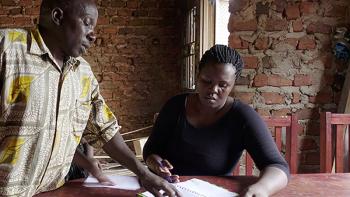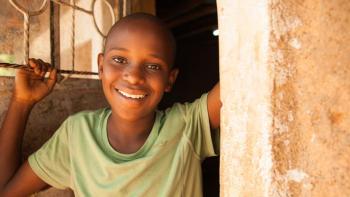Country Facts:
- Capital city – Kampala
- Population – 45.2 million
- Life expectancy – 63 years
- Unemployment rate – 4.3%
- Below poverty line – 42.2%
* International poverty line of US$2.15 (World Bank)
Find more country facts on: CIA The World Factbook – Uganda
Habitat Facts
- Habitat started in Uganda in 1982.
- Individuals served in FY 2022 – 930
- Through new construction – 300
- Through incremental construction – 15
- Through market development – 585
The housing need in Uganda
Uganda’s housing situation is characterized by inadequate homes - both in terms of quality and quantity - in rural and urban areas. The housing deficit stands at 2.4 million housing units, of which nearly 1.4 million are in rural areas. An estimated 900,000 units are substandard and in need of replacing or upgrading. Uganda’s expected population growth will require an additional 3 million housing units or more.
Housing is more than a physical structure. A safe, affordable home provides the foundation for vulnerable families to access wider development opportunities. UN Habitat’s Right to Adequate Housing emphasizes that housing is the key to other vital rights-based services, such as clean and safe water, hygiene and sanitation; health; food and livelihood security; and environmental sustainability and gender equality.
How Habitat addresses the need
Vulnerable group housing
We provide social housing support for vulnerable rural households, especially women, children, orphans and their caregivers through home construction. Each home has a ventilated pit latrine, shower stall and water tank. We also train families to protect themselves against HIV/AIDS, to be informed about sexual and reproductive health, succession planning, inheritance rights, sanitation and hygiene, and malaria prevention. Recognizing the connection between housing and livelihood security, we support youth in these households to develop vocational skills relevant to their local market, such as tailoring, carpentry and masonry.
Housing microfinance
Accessing credit is a real challenge for low-income families in Uganda s cash-based society. We support low-income earners, especially those working in the informal sector, to access incremental microloans directly and through partnering financial institutions to improve their shelter.
Market systems development
Habitat Uganda offers institutional technical assistance to financial institutions and private sector actors to develop more competitive, inclusive and resilient housing microfinance products and services that serve middle to low-income clients.
Urbanization
We partner with local governments and municipal development forums to address urban issues. We focus on affordable urban housing, hygiene and sanitation, promotion of good environmental practices, and economic empowerment to impact the lives of vulnerable communities in the growing urban areas.
What you can do
DONATE
Please visit habitat.org/donate and designate your gift to Habitat Uganda.
VOLUNTEER
The Global Village program is resuming region by region until a safe and quality experience can be provided at scale worldwide. Please visit habitat.org/gv for more information and updates.
TITHE
Habitat affiliates in the U.S. support the international work through an annual tithe. For additional information, email: [email protected] or contact your local Habitat organization.
CONTACT
Habitat for Humanity Uganda
Please reach out to:
Paul Okiring
National Director
Website: https://habitat.ug/

